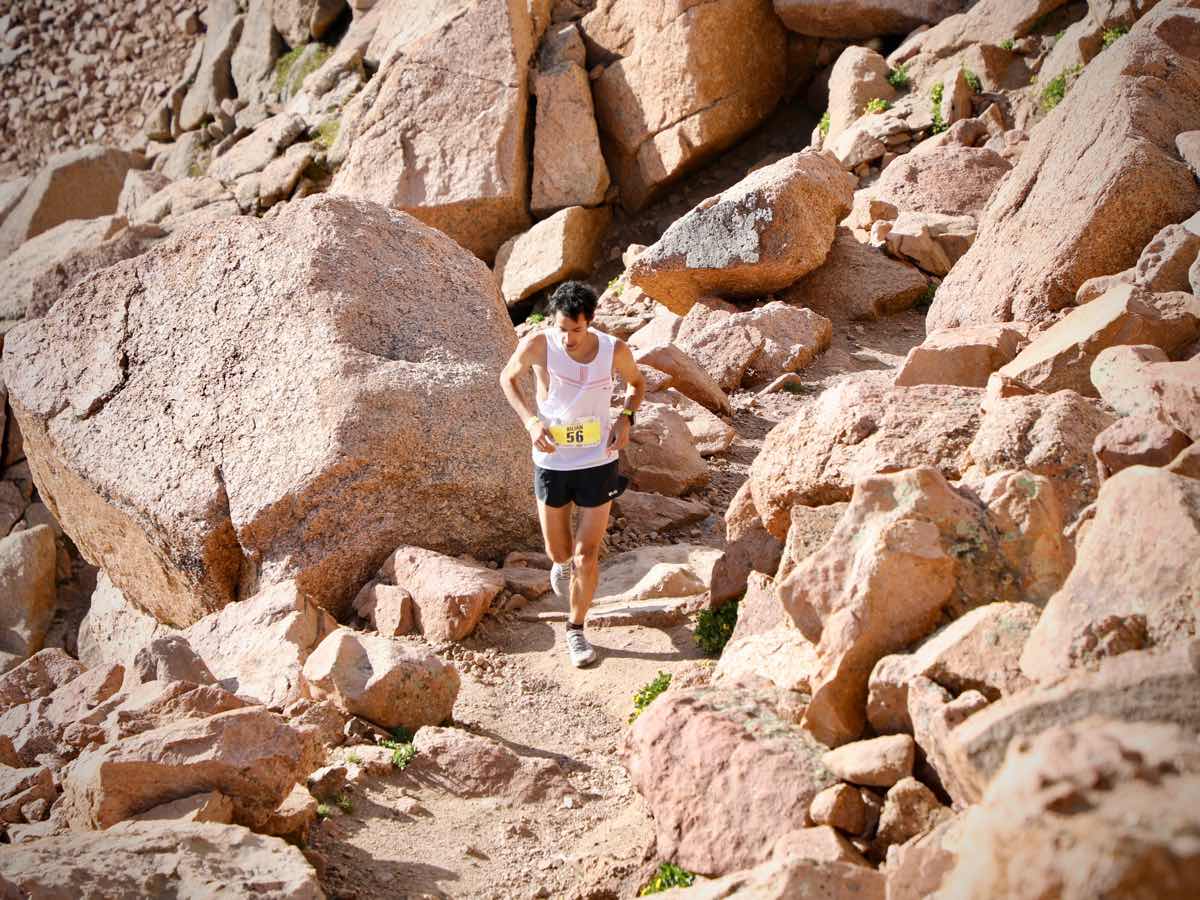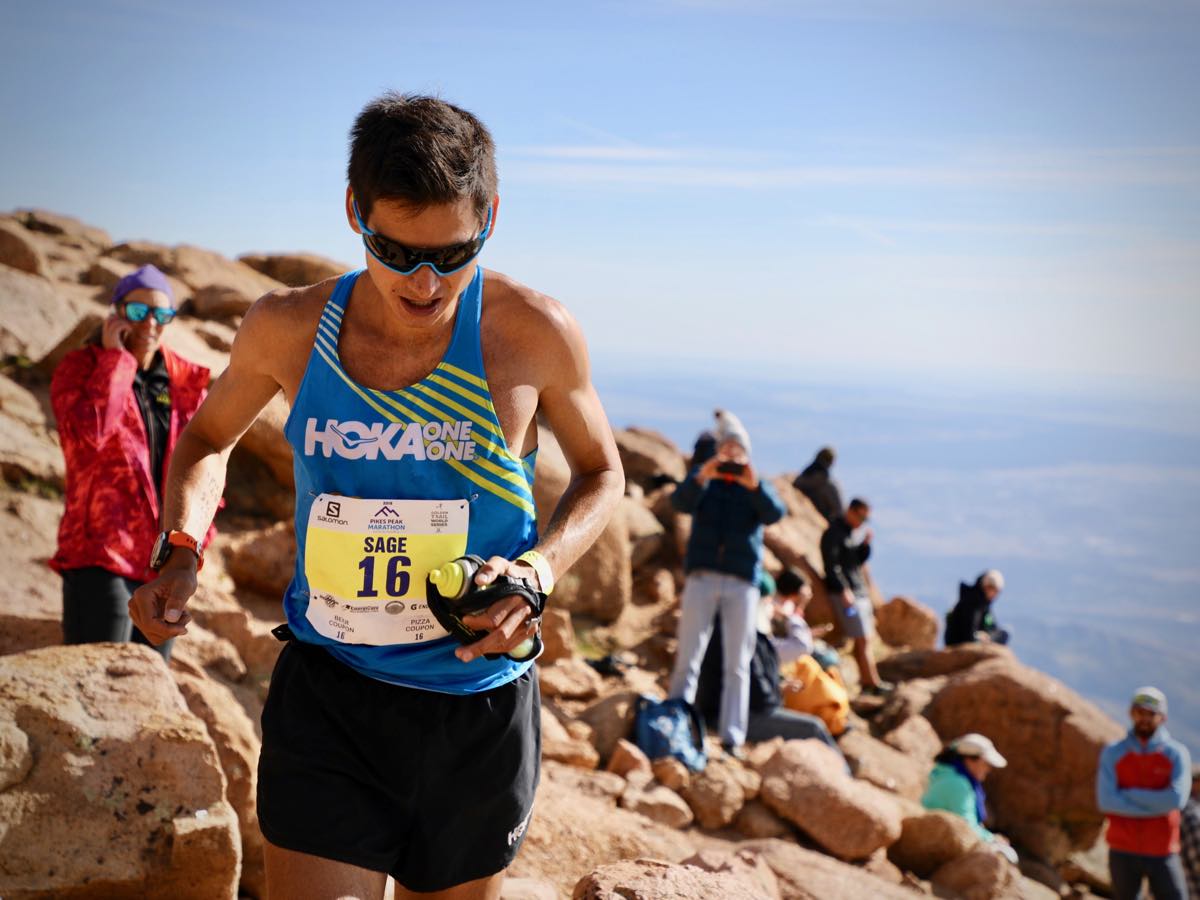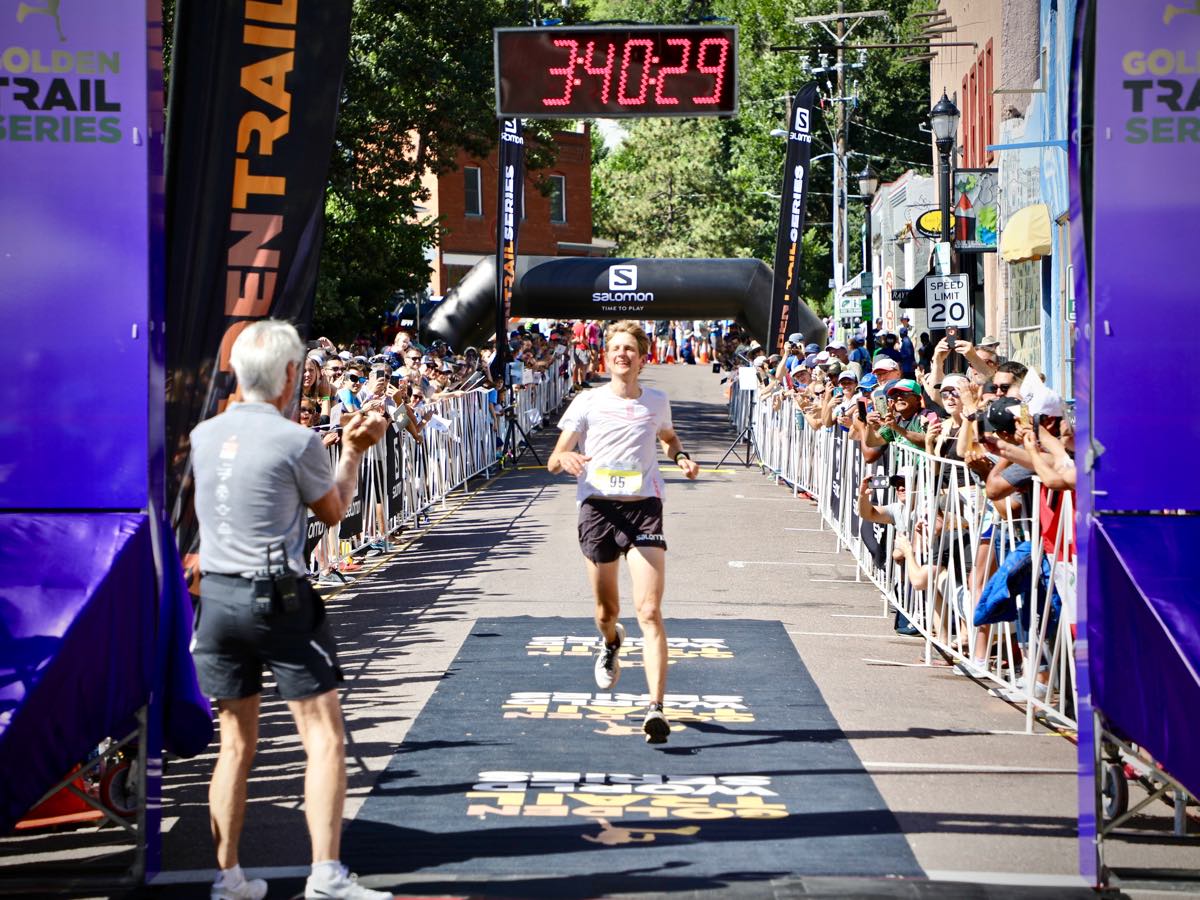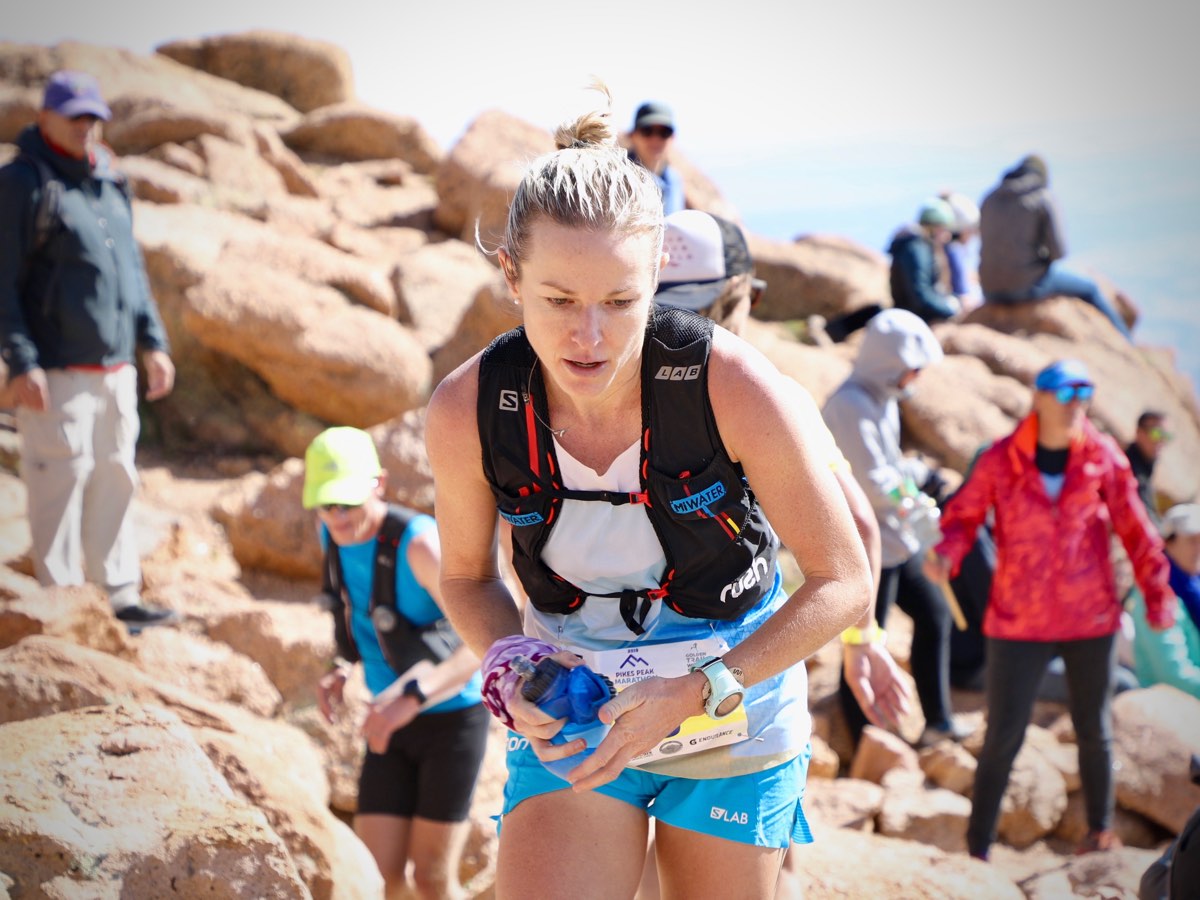The Pikes Peak Marathon is a one-of-kind race. Runners begin on the streets of Manitou Springs, Colorado, run a half marathon to the top of 14,115-foot Pikes Peak on the historic Barr Trail while climbing 7,770 feet, and descend all the way back to downtown Manitou again. Add in the factors of altitude, Colorado’s hot summer temperatures, an at-times-sandy trail, now 64 years of history, as well as deep competition and this adds up to a race story as unique as the event itself.
Kilian Jornet returned to this race for the second time, his first time since 2012, and ran unchallenged at the race’s helm, finishing in the sixth-fastest time in the race’s now-64-year history. Maude Mathys, too, proved untouchable in the women’s race, setting a big new women’s course record.
Thanks to Salomon for making our coverage of this year’s Pikes Peak Marathon possible!
To get all the latest ultra news from iRunFar.com, subscribe via RSS or email.
2019 Pikes Peak Marathon Men’s Race
There was a lot of speculation prior to the 2019 Pikes Peak Marathon, especially around Matt Carpenter’s record of 3:16:22 which he set in 1993 and whether the Spaniard who lives in Norway Kilian Jornet (pre-race and post-race interviews) could possibly break it. Many people thought he could and many thought he wouldn’t–the latter group including Jornet himself who said pre-race that Carpenter’s record was something “really special.” By just a couple miles into the race, Jornet had already broken free of the field and basically solo time trialled the rest of the event. He summited Pikes Peak in 2:09, some eight minutes off record pace but four minutes in front of anyone else, proving himself a level in front of the rest of the men’s field but not on the level of Carpenter circa 1993. Between the summit and the finish line, Jornet put another 7.5 minutes on everyone else, crossing the line in 3:27:28. No doubt, this is a fast time, the sixth-fastest in the race’s long and competitive history.

Kilian Jornet near the summit of Pikes Peak on his way to winning the 2019 Pikes Peak Marathon. Photo: iRunFar/Meghan Hicks
After a couple rough races, American Sage Canaday (post-race interview) has come on strong with his 11th place at Sierre-Zinal two weekends ago and now a great performance here. Canaday ran among the men’s leaders until just after halfway up the half-marathon ascent. From there all the way up to the 14,000-plus-foot peak, he built a gap on the rest of the men’s field, arriving to the top in second place and 3.5 minutes in front of third. He said after the race that he knew he was a better ascender than descender, so he wanted to get a gap to the top that he could hold to the finish. This is exactly what he did, arriving to the finish line still solidly in second. His 3:39 finish improves upon his sixth-place debut here last year in 3:46.

Sage Canaday running toward second place at the 2019 Pikes Peak Marathon. Photo: iRunFar/Meghan Hicks
Switzerland’s Marc Lauenstein (post-race interview), who was the 2014 Pikes Peak Marathon champion, arrived to the Pikes Peak summit in third place, looking calm and floating in the high-altitude thin air. He opened it up on the descent to clock the day’s second-fastest downhill. It quite the charge, not enough to catch second-place Canaday but plenty fast to hold off everyone else.

2014 Pikes Peak Marathon champion Marc Lauenstein takes third at the race’s 2019 edition. Photo: iRunFar/Bryon Powell
Spaniard Aritz Egea and American David Sinclair seemed to battle for much of the race, the pair arriving to the summit within just a few seconds of each other, Sinclair a bit ahead. Their duel went all the way to the line with Egea and his Basque Country bloodline beating Sinclair by just about a half minute. It was Sinclair’s second year in a row of finishing in fifth.
2019 Pikes Peak Marathon Men’s Results
- Kilian Jornet (Salomon) – 3:27:28 (pre-race and post-race interviews)
- Sage Canaday (Hoka One One) – 3:39:03 (post-race interview)
- Marc Lauenstein (Salomon) – 3:40:29 (post-race interview)
- Aritz Egea (Salomon) – 3:45:56
- David Sinclair (Salomon) – 3:46:35
- Henri Ansio (Salomon) – 3:47:07
- Thibaut Baronian (Salomon) – 3:47:35
- Juan Carlos Carera (Buff) – 3:48:02
- Michelino Sunseri – 3:48:47
- Francesco Puppi (Hoka One One) – 3:50:04
- Christian Gering (Salomon) – 3:50:15
- Petter Engdahl (Salomon) – 3:51:02
- José Quispe – 3:54:23
- Jacob Adkin (Salomon) – 3:57:21
- Andy Wacker (Nike Trail) – 3:58:46
- Rémi Bonnet (Salomon) – 4:05:46 (pre-race interview)
- Karl Egloff (Movistar) – 4:07:22
- Scott Spillman – 4:10:05
- Tim Freriks (Hoka One One ) – 4:11:03 (pre-race interview)
- Max King (Salomon) – 4:13:03
2019 Pikes Peak Marathon Women’s Race
Ahead of the race, much more talk was about the men’s record than the women’s. Despite this, it was Switzerland’s Maude Mathys who put on the master class of record breaking. After her Sierre-Zinal showdown, where she set a record two weeks ago, she had a bright day here on Pikes Peak too. She started in the front, pushed the pace, and gained all her time on the record on the uphill. At Barr Camp, 7.6 miles into the race, she was more than six minutes up on the record. Then, at the summit turnaround, she was 13-plus-minutes ahead of the record. Like Kilian Jornet in the men’s race, Mathys solo at the front of the women’s race went more like a time trial. From the summit to the finish, she ran very strong, but not fast enough to gain any more time on the record. Her 4:02:41 is a new course record that bests Megan Kimmel’s 2018 time of 4:15:04 by about 12.5 minutes.
(In 2015, Mathys received a warning without suspension from the Disciplinary Chamber for Doping Cases of Swiss Olympic for two positive tests for clomifene [previously clomiphene] after it was determined that she was mistakenly taking the drug without first obtaining a World Anti-Doping Agency Therapeutic Use Exemption. Mathys’s Quartz Program profile shows regular health monitoring and a July 2019 anti-doping control. Quartz Program info.)

Maude Mathys setting a new Pikes Peak Marathon record at the race’s 2019 edition. Photo: iRunFar/Bryon Powell
Yngvild Kaspersen (pre-race and post-race interviews) had her own fantastic race. By the time she passed Barr Camp at mile 7.6, she was a minute in front of the rest of the field. This lead would basically grow by a few seconds to a minute each time we saw her. Kaspersen, a Norwegian who lives at sea level, said after the race that she was nervous about the extremely high altitude of Pikes Peak. It turns out she had not much to worry about, as she looked like she was jogging easily at the summit turnaround. She also said that her two-week vacation in Colorado ahead of the race probably helped her to feel comfortable up there. Kaspersen had a great downhill run, posting the day’s fastest women’s downhill split and crossing the line with a gap to the rest of the field.

Yngvild Kaspersen looking strong in second at the 2019 Pikes Peak Marathon. Photo: iRunFar/Meghan Hicks
Strong, steady, and even-keeled on both the uphill and downhill is how I would describe South Africa’s Meg Mackenzie’s (pre-race and post-race interviews) performance. And honestly, I found this effort to be quite impressive because it looked like she experienced all-day pressure from Amandine Ferrato of France. A bit like the men’s race pair Aritz Egea and David Sinclair, Mackenzie and Ferrato were almost always passing us within a few seconds of each other. At the summit turnaround, it was actually Ferrato who arrived in third and Mackenzie fourth. By halfway down the descent, Mackenzie moved solidly into third and was two minutes ahead of fourth-place Ferrato, a gap she’d basically take to the finish.

Meg Mackenzie summiting Pikes Peak en route to third place at the 2019 Pikes Peak Marathon. Photo: iRunFar/Meghan Hicks
Spain’s Eli Gordón (pre-race interview) had a move-up-from-the-back kind of race, starting out in the back half of the women’s top 10 and then moving into the top five by the race’s halfway point. Her work was not yet done, though, as she was challenged by the women behind her to maintain a fast descent pace. She looked truly relieved to cross the finish line in Manitou Springs as the fifth-place finisher.
2019 Pikes Peak Marathon Women’s Results
- Maude Mathys (Salomon) – 4:02:41
- Yngvild Kaspersen (adidas) – 4:27:26 (pre-race and post-race interviews)
- Meg Mackenzie (Salomon) – 4:32:19 (pre-race and post-race interviews)
- Amandine Ferrato (Hoka One One) – 4:34:09
- Eli Gordón (Salomon) – 4:43:46 (pre-race interview)
- Sara Kadlec – 4:45:44
- Sarah Guhl – 5:06:29
- Céline Lafaye (Merrell) – 5:07:08
- Becca Bramley – 5:14:57
- Julie Powell – 5:15:38
- Wendy Stalnaker – 5:41:48
- Carly Wilborn – 5:44:40
- Ellie Webb – 5:47:00
- Dawn Greenwalt – 5:47:28
- Gina Harcrow – 6:00:28
- Alana Papula – 6:01:45
- Melissa Mincic – 6:02:22
- Freya Powers Stein – 6:15:25
- Erin Bonthron – 6:15:39
- Janice Flynn – 6:16:29
Coverage Thanks
Thank you to our coverage team who spread out over Pikes Peak to bring you coverage, including Kim Wrinkle, Tom Caughlan, Brandon Stapanowich, Kris Miller, Stephen Gnoza, Ivan Schwendt, David Hedges, Melissa Saliba, Dreama Walton and her family, Mitch Walma, and Steve Bremner. Thank you also to Casey Szesze and Mauri Pagliacci who provided invaluable support in the iRunFar office.

